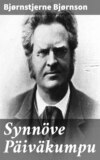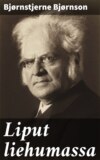Loe raamatut: «Magnhild; Dust», lehekülg 8
CHAPTER XI
Magnhild and Rönnaug came arm in arm out of the wood where Rönnaug had finally been obliged to seek her friend, where so many confidences had been made, so much discussed and considered. They emerged into the open plain. How blue the haze about the mountains! And this was the frame for the pine forest, the surrounding heather, and the plain with Miss Roland and the child. The latter were sitting on blue and red rugs near the carriage. From this foreground the mother's eye wandered away more musingly than ever, and gained even stronger impressions of outline, light, color.
"The summer travels in Norway! The summer travels in Norway!" she kept saying to herself.
From the way in which she uttered these words it might be surmised that in the entire English vocabulary there was nothing which admitted of being repeated with such varied shades of meaning.
The two friends took a long ramble. Magnhild had become a new being to Rönnaug, her individuality enriched, her countenance illumined and thus transformed. For nearly five years Magnhild had been secretly brooding over her lost vocation, and her lost love, those two sisters that had lived and died together. At length she had opened her heart to another; thus something had been accomplished.
The horses were now hitched to the carriage, and the party drove on. The noonday repose of nature was not disturbed by so much as the rumbling of the wheels, for the carriage wound its way slowly over the mountain slopes.
At the next post-station the following lines were found in the register: —
"There met us croaking ravens on our way:
We knew that Evil this to us did bode;
We made no off'rings, though, as on we rode,
To angry gods – the mild are fall of doubt.
Why should we care? One God to us feels kindly.
He is with us! And Him we follow blindly: —
We laugh at all the omens round about."
These little verses began to affect the party like a chorus of birds.
But a joy to which we are unattuned is apt to jar; and here, moreover, the verses became prophetic, for the travelers had gone but a short distance when they gained a view of the church steeple on the heights where Magnhild's parents and brothers and sisters were buried, and of the stony ground in the mountain to the left where the home of her childhood had been situated.
This barren patch of stones always rose up distinctly in Magnhild's mind when she thought of her own life, whose long desert wastes seemed to lay stretched out before her like just such a heap of ruins. Here it faced her once more. It was some time before the consolation she had newly grasped could find expression, for she was haunted by so much that was unsolved, so much that was doubtful. She was now approaching the starting-point of the whole; from the brow of the hill the parsonage was visible.
It had been agreed that they should stop here. The carriage rolled down toward the friendly gard through an avenue of birch-trees. Rönnaug was giving Miss Roland a most humorous description of the family at the parsonage when suddenly they were all terrified by having the carriage nearly upset. Just by the turn near the house-steps the coachman had driven against a large stone which lay with its lower side protruding into the road. Both Rönnaug and Miss Roland uttered a little shriek, but when they escaped without an accident they laughed. To their delight Magnhild joined in their laughter. Trifling as had been the occurrence, it had served to rouse her. She was surprised to find herself at the parsonage. And this stone? Ah, how many hundred vehicles had not driven over it! Would it ever be removed, though? There stood old Andreas, old Sören, old Knut? There, too, was old Ane, looking out! From the sitting-room came the sound of a dog's bark.
"Have they a dog?" asked Magnhild.
"If they have," replied Rönnaug, "I will venture to say it came through its own enterprise."
Old Ane took the luggage, Rönnaug the child, and the whole party was ushered through the passage into the sitting-room, where no one was found except the dog. He was a great shaggy fellow, who at the first kind word relinquished his wrath, and in a leisurely way went from one to the other, snuffing and wagging his tail, then sauntering back to the stove, lay down, fat and comfortable.
A creaking and a grating could now be heard overhead; the priest was rising from the sofa. How well Magnhild knew the music of those springs! The dog knew it too, and started up, ready to follow his master. But the latter, who was soon heard on the groaning wooden stairs, did not go out but came into the sitting-room, so the dog only greeted him, and wagging his tail went back to the stove, where he rolled over with a sigh after his excessive exertion.
The priest was unchanged in every possible particular. He had heard about Rönnaug, and was glad to see her; his plump hands closed with a long friendly clasp about hers and with a still longer one about Magnhild's. He greeted Miss Roland and played with the child, who was in high glee over the unfamiliar objects in the room, especially the dog.
And when he had lighted his pipe and had seated the others and himself on the embroidered chairs and sofas, the first thing he must tell them (for it was just about a month since the matter had been successfully terminated) was that the "little girls" were provided for. There had been secured for each an annuity. It was really on the most astonishingly favorable terms. God in his inconceivable mercy had been so good to them. About the "Fröken" (so the former governess was usually called), they had had greater cause for anxiety. They had, indeed, thought of doing something for her, too, although their means would scarcely have sufficed to make adequate provision for her, and she had grown too unwieldy to support herself. But God in his inscrutable mercy had not forgotten her. She no longer needed an annuity. She had gone to make a visit at the house of a relative not many miles distant, and while there God had called her to Himself; the journey had been too much for her. This intelligence had reached the parsonage a few days before, and the priest was in great uncertainty as to whether a bridal couple would postpone their wedding for a few days.
"Thus it is, dear Magnhild, in life's vicissitudes," said he. "The one is summoned to the grave, the other to the marriage feast. Ah, yes! But what a pretty dress you have on, my child! Skarlie is truly a good husband to you. This cannot be denied."
The mistress of the house and her two daughters at length appeared. The moistened hair, the clean linen, the freshly ironed dresses, betokened newly-made toilets. They had not a word to say; the priest took charge of the conversation, they merely courtesied as they shook hands, and then, taking up their embroidery, sat down each on her own embroidered chair. One of the daughters, however, soon rose and whispered something to her mother; from the direction in which first her eyes then her mother's wandered, it might be concluded that she had asked whether the gauze covers should be removed from the mirror, the pictures, and the few plaster figures in the room. As the girl at once took her seat again, it must have been decided that the covers should not be removed.
"Tell me about the Fröken who is dead," said Magnhild.
With one accord the three ladies dropped their embroidery and raised their heads.
"She died of apoplexy," said the priest's wife.
They all sat motionless for a moment, and then the ladies continued their embroidery.
The priest rose to let the dog out. The animal departed with the appearance of being excessively abashed, for which the priest gave him much praise. Then followed a lengthy account of the dog's virtues. He had come to them three years ago, the Lord alone knew from where, and He alone knew why the dog had come to the parsonage; for the very next summer the animal had saved the "Fröken's" life when she was attacked on her accustomed walk to the church by Ole Björgan's mad bull.
The third great event, that old Andreas had cut his foot, was next detailed at quite as great length. The priest was just telling what old Andreas had said when he, the priest, was helping him to the couch, when the narrative was interrupted by an humble scratching at the door; it came, of course, from the dog. The corpulent priest rose forthwith to admit the animal, and bestowed on him kind words of admonition, which were accepted with a timid wagging of the tail.
The dog glanced round the room; observing that the eyes of the priest's wife manifestly rested with especial friendliness on him, he walked up to her, and licked the hand extended to him.
At this moment Magnhild rose, and abruptly crossing the floor to where the priest's wife sat, she stroked her hair. She felt that every one was watching her, and that the mistress of the house herself was looking up in embarrassed surprise, – and Magnhild was now powerless to explain what she had done. She hastened from the room. Profound silence reigned among those left behind.
What was it? What had happened? It was this: in the forenoon Magnhild had received a letter, as we know, and it had caused her to look with new eyes on the life at the parsonage.
The tedium seemed uplifted, and behind it she beheld a kindness and an innocence she had always overlooked. And she began to understand the character of that home.
There was not a word in the priest's narratives, from beginning to end, designed to call attention to the good he or any of his household had done. The listener was left to find this out for himself. But the dog had discovered it before Magnhild.
The dog returned thanks; had she ever done so? The thought had rushed over her with such force that it caused her to feel an irresistible impulse to express her gratitude. The universal astonishment caused by her effort to do so made her for the first time realize how unaccustomed her friends were to thanks, or indication of thanks from her, and she became frightened. This was the reason why she had left the room.
She took the road leading up toward the church, perhaps because it had just been mentioned. Her new views wholly absorbed her. Until now she had seen only the ludicrous side of the life at the parsonage. The members of the household had provoked, amused, or wearied her. But hitherto she had not been aware that what had just been praised in herself had been gained by her in this household whose influences had spread themselves protectingly over her soul, just as the embroidery was spread over the furniture in these rooms. Had all the weaknesses of the house served Skarlie as a means to ensnare her, in this same house she had acquired the strength wherewith to resist his power until the present time.
If she had lived here without forming close relations with any one, the fault lay not alone in the monotonous routine of the house: it was due chiefly to herself, for even in the days of her life at the parsonage she had wrapped herself up in dreams. It must have required all the forbearance by which the family were characterized to bring her, notwithstanding all this, to the point she had reached. In any other family she would have been shown the door – dull, awkward, thankless as she had been.
Yes, thankless! Whom had she ever thanked? Aye, there was one – him who had done her the most harm but also the most good; for him she loved. But this could scarcely be counted.
But whom else? Not Skarlie, although he had been incessantly kind to her, even he. Not Fru Bang, and how kind she had been! Not Rönnaug; no, not Rönnaug either.
She was appalled. For the first time in her life she held true communion with herself, and she had done little else all her life than commune with herself.
Now she comprehended, although once before she had been startled by a passing thought of the kind; now for the first time she comprehended what it must have been to Rönnaug after having longed for so many years to tell her about the rich change in her own life, to show her her child, to bring her freedom and increased happiness; and then to find a person who did not even care to take the trouble to walk to the hotel, not a hundred steps distant, because, forsooth, it would necessitate her dressing herself.
She sat once more on the heights facing the ruins of the home of her parents; and she covered her face in shame.
From the thoughts to which this spot gave birth she did not escape until evening, weary in body and in soul.
When late in the evening she said good-night to Rönnaug, she threw her arm round her, and leaned her head against hers. But words refused to come; they are not easily found the first time they are sought.
CHAPTER XII
The next morning Rönnaug dreamed of singing; she still heard it when she awoke, and ere long she had so far collected herself as to consider whether it could really be Magnhild who was singing. This thought caused her to become wide awake and to leave her bed.
She scarcely waited to don her morning-gown before she opened a window. From the sitting-room, which was at the other end of the house, there came the sound of singing and a low piano accompaniment. The voice was pure and high; it must be Magnhild's.
Rönnaug made haste to complete her toilet and go down-stairs. She carried her boots out into the passage and put them on there lest she should awaken Miss Roland and the child. There was some one coming up the stairs. Rönnaug quickly put down her boots and stepped forward; for the head which was now displayed to her view was Grong's. What, Grong here?
He greeted Rönnaug with a keen, hasty glance, and, without a word, went into an apartment near hers.
Rönnaug sat listening to the singing while she put on her boots. It flowed so equally and calmly; unquestionably there was joy in it, but the joy was subdued – it might be called pure.
She remained still until Magnhild ended, and even then paused a little while. She finally went down-stairs. The door of the sitting-room was half open, which accounted for her having heard so distinctly. Magnhild had turned round with the piano-stool and sat talking with the two friends of her childhood, who had seats one on each side of her. She had been singing for them, it would seem.
They all rose as Rönnaug entered. Magnhild called her friend's attention to the clock. Verily, the hour hand pointed to ten. Magnhild had been up a long time – and singing.
The girls withdrew to carry coffee, eggs, etc., into the dining-room. As soon as Magnhild saw that she and Rönnaug were alone, she hastened to ask if Rönnaug knew that Grong was at the parsonage. Rönnaug told about having just met him.
"Yes," whispered Magnhild, "he is traveling in search of his son. Only think, the young man has eloped with the girl to whom he is betrothed! He is twenty years old, she about sixteen."
"So, then, the verses – ?"
"Were of course by Grong's son. Grong is furious. He wanted to make a poet of his son, though!"
They both laughed.
The young man was really extraordinarily gifted, Magnhild further narrated, and for his sake his father had read extensively, besides taking long journeys with his son in Germany, France, Italy, and England. Plans had been made to give the young man an opportunity of gaining an impression of the scenery of his fatherland and of country life, but – pop! – the bird had flown.
Grong was now heard on the stairs, so nothing more was said. He gave the ladies a sharp glance as he entered, then began to pace the floor, as completely hidden by his beard as though it were a forest, and veiled by his spectacles as an image is veiled in a fountain.
They sat down to the late breakfast, and the priest's wife received them, one by one, with diffident friendliness. The priest had gone down to the school-house to attend a meeting.
After the meal was over, Grong, who had not opened his mouth for any other purpose than to eat and to drink, walked through the sitting-room and passage directly out to the door-steps. Rönnaug bravely followed; she wished to talk with him. He discovered this and made an effort to escape, but was overtaken and obliged to walk up the road with Rönnaug. When he heard what she wanted, he exclaimed: —
"I have been so confoundedly bored with this tall woman and her tiresome vocation, that you will find it impossible to get one word out of me. Besides, I am expecting my 'skyds.'"
He was about to turn away; but Rönnaug held fast to him, laughing, and brought him back to the theme. Before she had succeeded, however, in laying before him the necessary facts, he interrupted with, —
"The fact is she has no vocation whatever; that is the whole secret of the matter. Her singing? Tande so often wrote to me about her singing. Well, I have been listening to her singing this morning, and do you know what I think about it? Technical correctness, good method, pure tone, in abundance; but no fancy, no inspiration, no expression; how the deuce could there be! Had she had fancy, she would have had energy, and with her voice, her natural technical ability, she would have become a singer, whether there was a Tande or not, whether she had married a Skarlie or a Farlie."
Notwithstanding the harsh, blunt form in which this idea was framed, there might be sufficient truth in it to make it worth while to place Magnhild's history before Grong in its true light. Grong could not resist the fascination of a soul's experiences. He became all ear, forgetting both his ire and his "skyds."
He heard now about the Magnhild who would scarcely take pains to dress herself, and who let Skarlie do and say what he pleased, but who the moment Skarlie mentions Tande's name and hers together, in other words, invades her inner sanctuary, flees forthwith from him to America. Was there no energy in that?
He heard about the Magnhild who, checked in her highest aspirations, became wholly indifferent. The relations with Tande were fully explained. Grong, indeed, had been partially acquainted with them by Tande himself. Rönnaug also thought it right to inform Grong of the purport of Tande's letter; she could recall it perfectly, for it had made a deep impression on her.
What an impression did it not make on Grong!
How much it must have cost this man in his time to renounce what he had originally believed to be his vocation. And now to have to give up his hopes for his son? How could she and Magnhild have laughed at this – as they had done that same morning.
"Consolation in the idea that our calling is greater and more manifold than we ourselves are aware? Yes, for those who can blindly and without exercise of their own wills place themselves under subjection to the unknown guidance! I cannot do so!" He raised his clinched hand, but let it fall again. "Is it a crime to steer toward a definite goal, and concentrate one's will, one's responsibility upon its attainment? Look at yonder insect! It goes straight forward; it has a fixed aim. Now I crush it to death. See – thus!
"You should have seen my wife," he continued, presently. "She sped onward through life, with fluttering veil; her eyes, her thoughts sparkled. What was her goal? Just as she was beginning, with my aid, to comprehend her faculties, she expired. A meteor!
"I had a friend. What talents, and what aspirations! How handsome he was! When he was but little over twenty years of age, he fell during the siege of a Danish fortress, scarcely mentioned, scarcely remembered. A meteor!
"But what solicitude for existences which neither can nor will be of any use in the world. That fisherman in Nordland was the only person who was saved from destruction out of a whole parish. And he lived more than sixty years as stupid as the codfish he drew out of the sea.
"For the sake of others? For the advancement of one's fellow-creatures? For the good of posterity? Aye, aye, find consolation in all this, if you can! Before I shall be able to do so I must see the benefit of it for myself. The mole's life in the dark, with chance alone for its guide, is not a life that I could lead, even though I might have a certificate guarantying that light should dawn on me one day, that is to say, on the other side of the grave. I admire those who can be content with such a lot."
"In other words, you despise them!" interposed Rönnaug.
Grong looked at her, but made no reply.
Rönnaug was anxious to know how it was best to advise Magnhild. Grong promptly answered, —
"Advise her to go to work."
"Without definite object? Merely for the sake of work?"
He hesitated a moment, and then said, —
"I will tell you one thing, my good lady: Magnhild's misfortune has been that throughout her whole life she has had every want supplied, every meal, every garment. Had she been obliged to labor hard, or to bring up children, she would not have indulged so freely in dreams."
"So, then, work without definite aim?" repeated Rönnaug.
"There are so many kinds of aims," said Grong, peevishly, – and then he was silent. It was evident that he had been all round the circle and had returned to his wrath over what had befallen himself.
They had turned and were retracing their steps in the friendly birch avenue leading to the parsonage. The tones of a human voice were heard; they drew nearer, paused, and listened attentively. The windows were open, and every note rang out, clear and equal.
"Yes, there is purity in the voice," said Grong; "that is true. But purity is a mere passive quality."
They went on.
"Not technical skill alone, then?" queried Rönnaug.
To this Grong made no reply. He had fallen into a new train of thought. When they had reached the house, he roused himself.
"She and I are, both of us, I dare say, bearers of a half-completed family history. Nevertheless, her family dies out with her; and mine? Oh, all this is enough to drive one mad! Where is my 'skyds?'"
With these words he strode past the main building to the court-yard behind. Rönnaug slowly followed. The "skyds" had not yet arrived. Grumbling considerably, Grong sauntered up to the coach-house, whose doors stood open, and in which he saw Rönnaug's carriage. She joined him, and they discussed the carriage together. It was too light for a traveling carriage, Grong thought. One fore-wheel must already have been damaged, for it had been taken off. So, then, it depended upon the blacksmith how long the ladies would remain at the parsonage? But he would start without further delay; for there – at last – came the "skyds."
He bade her a light farewell, as though he were merely going to the next corner, and then went into the house for his luggage. Rönnaug, however, determined to wait until he came out again.
She had a kindly feeling for him. She earnestly hoped that the son's case was not so bad as the father now thought. There was so much unrest in Grong. Was not this caused by his having a great variety of "talents," but no one special talent? She had once heard Grong half jestingly make a similar assertion about another person. All these endowments, however, might be combined in one main tendency, of this Rönnaug felt sure. It might be the same in the case of Magnhild; but perhaps there was not sufficient talent there. Technical ability? Aye, if that were her chief endowment she could doubtless render it available in singing.
Rönnaug had failed to find the light she needed. This was truly discouraging; for counsel must be given, a resolution formed. She prayed God for her friend, and for this gloomy man now coming out of the house, accompanied by the priest's wife, who seemed to be the only person to whom he had said farewell.
"Present my greetings to my old teacher," he called down from the cariole, as he grasped the hand of the mistress of the house. "Tell him – tell him nothing!" and with this he whipped up his horse so suddenly that the "skyds" boy came near being left behind.
The priest's wife made some remarks about his surely being very unhappy, as she stood watching him drive away. While the ladies were still at the door, a woman came walking up the road toward them. She nodded and smiled at the mistress of the house as she passed on her way to the kitchen.
"You made your sale?"
"Yes."
"I thought so from your looks."
Then turning to Rönnaug the priest's wife said, —
"This woman, you may well believe, made Magnhild happy this morning."
"How so?"
"Why, she stopped here with her work on her way to the dealer, who makes purchases for a merchant in town. Just as she stepped inside Magnhild came down into the kitchen. When the woman caught sight of her, she eagerly addressed her – she is a great talker – and she began to cry and to talk, to talk and to cry, telling how poor she had been and how well off both she and her children now were. Magnhild, you know, for many years taught an Industrial School up in these mountains, and this woman was one of her aptest pupils. This hand-work, I can assure you, has spread rapidly here; there are scarcely any poor people to be found in our parish now."
"But Magnhild – was she glad?"
"She certainly must have been glad, for soon afterward we heard her singing. And the last time she was here – about four or five years ago – we could not persuade her to go near the piano."
Rönnaug now greeted Miss Roland, who was coming toward her with the child. A little later, as she was going through the passage to the sitting-room, the sounds of music once more floated out toward her. The priest's daughters were at the piano, singing a duet with feeble voices, one of which was more quavering than the other. They were drawling out, —
"All rests in God's paternal hand."
The door stood open. One of the girls sat at the piano, the other stood at its side. Magnhild sat facing them, leaning against the piano.
Peace radiated from the little hymn, because they who sang it were at peace. The small, yellow-haired heads above the stiff collars did not make a single movement, the piano almost whispered. But the sunshine, playing on the embroidered furniture and the embroidered covers, blended with the music a harmony from afar.
When they had finished singing, one of the girls told that a lady traveling that way had taught them the hymn, and the other, that her part had been arranged by the Fröken. Without uttering a word, without even changing her position, Magnhild held out her hand, which was clasped by the young lady nearest her.
At this moment voices were heard out of doors. The priest was approaching, accompanied by several men. As they stopped at the door-steps, Rönnaug entered the sitting-room. Soon a tramping of many feet was heard on the steps; the group at the piano rose, Magnhild crossed the floor to where Rönnaug stood. First the dog, then the priest, entered in solemn procession, and slowly following them came dropping in, one by one, six or seven of the farmers of the little mountain parish, heavy, toil-worn men, all of them. Magnhild pressed close up to Rönnaug, who also drew back a little, so that they two stood in front of the gauze-covered mirror. The priest said good-morning, first to Mrs. Randon, then to Magnhild, and asked how they were. Then the men went round the room, one by one, and shook hands with every one present.
"Call mother," said the priest to one of his daughters, and cleared his throat.
The mistress of the house soon appeared, and again man after man stepped forward, shook hands, and returned to his place. The priest wiped his face, stationed himself in front of the frightened Magnhild, bowed, and said: —
"Dear Magnhild, there is no cause for alarm! The representatives of our little parish chanced to assemble to-day in the school-house, and as I happened to mention that you were making a journey and had stopped at the parsonage on your way, some one said: 'It is due to her exertions that the poor-rates of this parish are so small.' Several others expressed the same sentiments. And then I told them that this should be said to your face; they all agreed with me. I do not suppose thanks have ever been offered to you, my dear child, either here or down at the Point, where the results of your work are even greater than here and have spread to the parishes on both sides of the fjord.
"Dear child, God's ways are inscrutable. As long as we can discern them in our own little destinies we are happy, but when we fail to see them we become very unhappy." (Here Magnhild burst into tears.)
"When you were carried downward by the landslide, with your sled in your little hand, you were saved in order that you might become a blessing to many.
"Do not scorn the gratitude of this humble parish: it is a prayer for you to the Almighty. You know what He has said: 'Inasmuch as ye have done it unto one of the least of these my brethren, ye have done it unto me.' May you realize this!"
The priest now turned toward his wife, and in the same solemn tone said, —
"Have refreshments handed to these men!"
He strode round among the latter with playful remarks, but the whole house seemed to shake beneath his tread. The more deeply Magnhild seemed moved the happier the priest was.
Magnhild felt a strong impulse to say something to him; for had she not found a refuge in his house, none of the results for which she had just received such unmerited thanks would have been accomplished. But the priest's impetuosity restrained her.
Refreshments were handed round; then the men once more shook hands with every one and withdrew, led by the priest, whose voice could be heard almost all the way to the school-house.



















